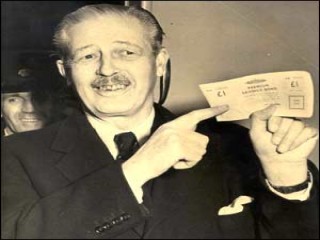
Harold Macmillan biography
Date of birth : 1894-02-10
Date of death : 1986-12-29
Birthplace : London, England
Nationality : British
Category : Politics
Last modified : 2011-06-06
Credited as : Politician, former Prime Minister,
The British politician and prime minister (Maurice) Harold Macmillan was one of the outstanding Conservative leaders of the 20th century in terms of achieving both unity in his party and electoral success.
Harold Macmillan was born on Feb. 10, 1894, in London, England. He was educated at Eton and at Balliol College, Oxford. During his World War I service in the Grenadier Guards he was wounded three times. From 1919-1920 he was an aide to the governor general of Canada. In 1920 he married into one of the most deeply rooted Conservative aristocratic families—the Cavendishes (Lady Dorothy Cavendish, daughter of the 9th Duke of Devonshire). She died in 1966. They had three daughters and one son.
This impeccable upper-class background served Macmillan in good stead in his prime ministerial career (January 1957-October 1963) when he wished to lead his party in directions that it would have found difficult to take from another leader. But in the early phase of his career this background could be seriously misleading. As member of Parliament for Stockton-on-Tees after 1924, he was no orthodox Conservative. He was deeply moved by mass unemployment; in such works as Reconstruction: A Plea for a National Policy (1933) and The Middle Way (1938) he advocated neo-Keynesian solutions to the economic crisis of those years that were by no means fashionable.
As an opponent of Neville Chamberlain's appeasement policy toward Hitler's Germany, and as a Conservative rebel, he was an obvious choice for Winston Churchill's wartime administration. Macmillan served as parliamentary secretary to the Ministry of Supply from 1940 to 1942, as undersecretary of state for the colonies in 1942, and his most important office, as minister resident at Allied Headquarters in Northwest Africa from 1942 to 1945. In the latter capacity he came close to Churchill and acted as an effective link between quarreling Allied military and political commanders.
After the war, he was made secretary of state for air in the caretaker government. In the Conservative government of 1951, Macmillan served first, and most successfully, as minister of housing and local government (1951-1954). He was then minister of defense, foreign secretary, and chancellor of the Exchequer (December 1955-January 1957) before succeeding Anthony Eden as prime minister in January 1957, a position he held until his resignation in October 1963.
As prime minister, Macmillan took over after the Suez operation, when President Abdul Nasser of Egypt nationalized the Suez Canal, and his party's morale and fortunes were at a low ebb. By 1959 the Conservatives had recovered enough to win a large electoral victory. His period in office was associated with developments that only Macmillan's public relations skills made acceptable to large sections of his own party: the acceptance of the move toward black African independence (1960), the initiation of formal government planning through the National Economic Development Council, and the approach to joining the European Common Market (now the European Union) in 1961. Macmillan was also instrumental in negotiating the Nuclear Test Ban Treaty that was signed by the former Soviet Union, England, and the United States in 1963.
Speaking to the South African Parliament in 1960, Macmillan said, "A wind of change is blowing through this continent. Whether we like it or not, the growth of national consciousness is a political fact."
In 1963 a downturn in the economy coupled with a sex scandal involving one of the prime minister's aides resulted in Macmillan's resignation from office. When he left public life, Macmillan returned to his family's publishing business, Macmillan Ltd., of which he became president in 1974. After years of refusing his peerage, he was created Earl of Stockton in 1984. Macmillan died of pneumonia, December 29, 1986, in Haywards Heath, West Sussex, England.
















